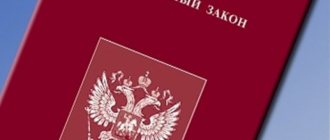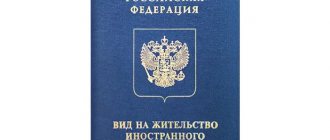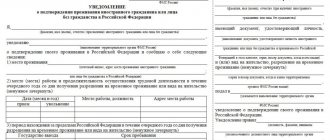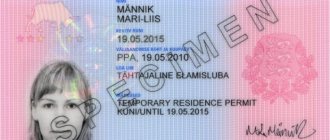Revocation of residence permit due to lack of annual notifications
Due to failure to notify, residence permits may be revoked.
A common reason for deprivation of status. Some residence permit holders are not aware of the need to report annually to confirm their residence. There are also those who know about this procedure, but do not take it seriously, skipping the submission of notifications.

Paragraph 15 of Article 9 of Federal Law No. 115 “On the legal status of foreign citizens in the Russian Federation ” clearly states: if a foreign citizen has not made a notification for two years in a row , then he may be deprived of his residence permit. Therefore, this procedure should be taken seriously.
What to do if a residence permit is refused
In some cases, a residence permit in the Russian Federation may not be issued to the person applying for it.
The grounds for refusal of a residence permit may vary. Thus, if there is evidence that a foreigner is a member of an organization engaged in terrorism or assists it, he will not be able to obtain a residence permit. Also, residence permits will be denied to persons convicted in their home country for serious crimes or those who have an outstanding criminal record.
Also, persons who have been expelled from the country within the previous five years may not be eligible for a residence permit. The same result awaits document applicants if it is established that they deliberately provided incorrect information about themselves or entered into a fictitious marriage for this purpose.
A foreigner or stateless person will not be able to obtain a residence permit if the medical commission does not issue a certificate confirming the absence of diseases dangerous to others.
In case of refusal to obtain a residence permit, such a decision can be challenged in court, using the services of a lawyer.
Incomes do not reach the subsistence level
- VRP
How to confirm income when applying for a residence permit
- Elena Voropaeva
- 19.03.2020
Russia requires that visitors provide for themselves without resorting to government assistance. Exceptions are made only for incapacitated citizens. By submitting a residence permit each year, a person with a residence permit must confirm that he has a source of income and is able to support himself and his family independently.
If income does not reach the subsistence level, then this is grounds for cancellation of a residence permit in accordance with paragraph 8 of Article 9 of Federal Law No. 115.
Absence from Russia for more than six months
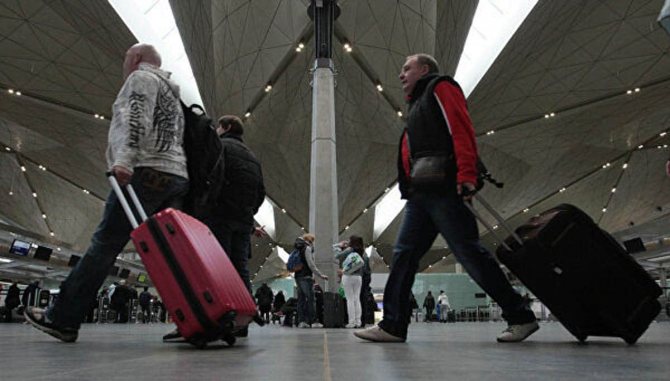
Migration authorities are ready to cancel the residence permit if the person has been absent from the Russian Federation for more than six months . Previously, the law did not specify whether we are talking about continuous absence or the period of departures is calculated in total during the year.
With the introduction of amendments to the legislation from November 1, 2021, this nuance was clearly outlined: you cannot stay outside of Russia for more than 6 months in total during one calendar year.
That is, you can travel abroad several times during the year, but in total the period of your stay outside the Russian Federation from January 1 to December 31 should not exceed six months. Otherwise, status may be revoked.
Staying abroad for a longer period of time is permitted in the following cases:
- a foreign citizen stayed in another country due to undergoing treatment;
- the status holder became seriously ill and could not return to the Russian Federation on time;
- a person’s close relative in a foreign country has died.
Also, if a migrant has exceeded the permissible period of travel due to business trips, then the status will not be canceled.
Grounds and reasons for refusal to issue a residence permit
A foreigner may be denied a residence permit or temporary residence permit for several reasons:
- If the applicant advocates that the foundations of the legal system of the Russian Federation need to be forcibly changed, commits actions that create a threat to the security of the country;
- If a migrant finances or plans terrorist acts, assists other persons in committing them, or takes direct part. Refusal to issue a residence permit is also issued in all other cases when a person directly or indirectly supports extremist activities;
- If the applicant, during the five years preceding the day of submitting documents for registration of a temporary residence permit or temporary residence permit, was brought to administrative liability in the form of expulsion from the country, deportation, or was repeatedly subjected to such types of punishment within ten years;
- If forged documents were submitted to the Ministry of Internal Affairs or the foreigner provided false information in the application;
- If a citizen of another state has a criminal record for committing a serious or especially serious crime, an act related to the trafficking of narcotic substances;
- If the migrant has an outstanding or unexpunged conviction for committing a serious or especially serious criminal act. A refusal to issue a residence permit on this basis will be issued regardless of where the crime was committed;
- If a person has been repeatedly brought to administrative responsibility for violating Russian administrative legislation related to ensuring security and the presence of foreign citizens in the country;
- If the applicant does not have the opportunity to provide the GUVM employee with a document confirming the fact of receiving funds, the amount of which is sufficient to provide him with a living wage. An exception to this rule is allowed only in situations where the person has evidence of disability;
- If a foreigner has not been able to acquire a permanent place of residence (owned real estate) within three years from the beginning of his residence in Russia;
- If the migrant left the country for the purpose of permanent residence in another state;
- If a citizen of another state was outside the Russian Federation for more than six months during the reporting period;
- If the applicant formalized a relationship with a Russian, which served as the basis for obtaining a residence permit, but subsequently this marriage was declared invalid by a court decision;
- If the migrant is a drug addict or does not have a document confirming the absence of HIV infections or other diseases that may pose a danger to society;
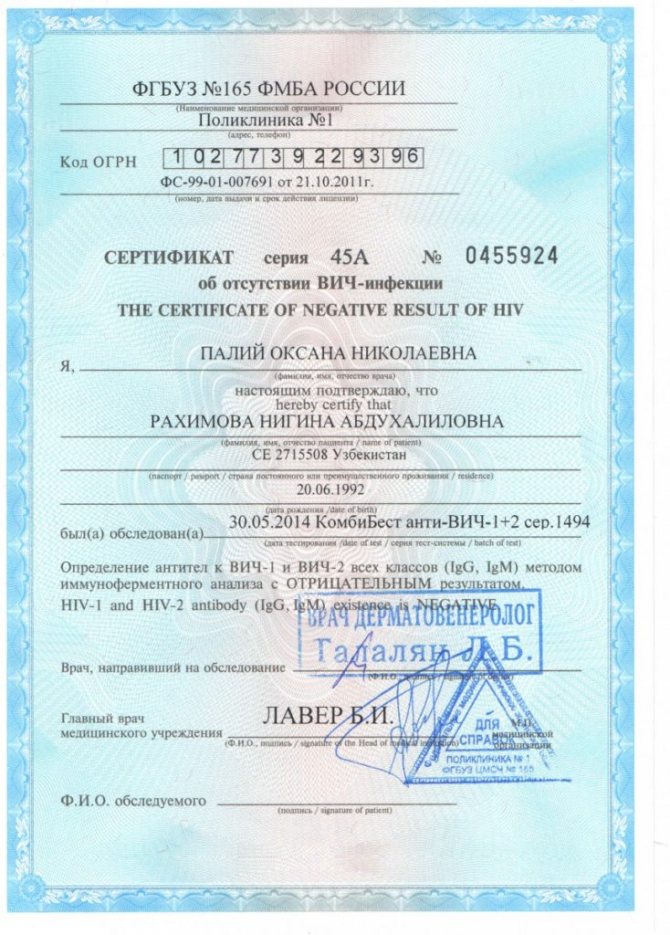
Sample certificate of absence of HIV infection from the applicant - If government officials made a decision that it is undesirable for a migrant to stay on the territory of the Russian Federation, provided that it was properly formalized.
Read also: What is the fine for expired registration in Russia?
Deprivation of residence permit due to administrative offenses
The list of reasons for cancellation includes the presence of administrative offenses on the part of the citizen. This is paragraph 7 of Article 9 of Federal Law-115. But there are two points here:
- The status is canceled only if offenses are recorded 2 times or more within one year .
- Cancellation of a residence permit is not possible for any offense. Status is deprived for acts related to drugs, violation of public order and non-compliance with migration legislation .
- VRP
Residence permit and car: what owners of personal transport will have to face
- Marina Danilova
- 28.12.2020
That is, directly for violating, for example, traffic rules, you will not be deprived of a residence permit. But there is one important nuance. The law states that a foreigner who has been brought to administrative responsibility two or more times in three years (under any article of the Code of Administrative Offenses) may be subject to an entry ban or deportation. Meanwhile, both denial of entry and deportation are direct grounds for revocation of a residence permit. Therefore, you should be extremely careful and, if possible, avoid any administrative offenses at all.
For what else can a residence permit be revoked?
The most common reasons for deprivation of status are listed above. But there are other reasons why migration authorities may decide to cancel:
- the status is canceled if a person advocates changing the constitutional system by force , that is, through riots and insurrections;
- connections with terrorist and extremist organizations , assistance in the preparation of terrorist attacks lead to deprivation of a residence permit;
- due to administrative expulsions and deportations in the past, the residence permit may be revoked;
- the use of fictitious documents is another reason for cancellation;
- if a person provided false information - intentionally or out of ignorance - then the residence permit is also cancelled;
- the commission of serious, especially serious crimes , as well as illegal acts related to drugs, leads to revocation;
- It is also undesirable to live in the Russian Federation for a long time due to migration registration. If within three years after entering Russia a person has not registered at his place of residence, the residence permit may be cancelled. If you live under migration registration and cannot register at your place of residence, you can exit/enter.
- A person with a drug addiction may have his right to permanent residence in the country revoked.
Why can TRP and residence permit be cancelled?
The process of revoking a residence permit
The huge area of the Russian Federation and borders with many countries with a low standard of living pose difficult tasks for the Federal Migration Service. The flow of illegal migrants is so great that the most effective way to combat it is raids, which are carried out regularly when information is received about a large concentration of people of foreign origin in one apartment, house, or suburban area. Very often, working and living conditions do not meet international standards. Migrants need food and medical care.
The procedure for action by the FMS authorities
The situation with foreigners and stateless persons who illegally crossed the border is simple.
If they do not have all the necessary documents, they are subject to deportation. It is more difficult to look for offenders who received work and residence permits illegally or who broke the law. The legislation of the Russian Federation contains a detailed list of all possible offenses that will entail the revocation of permission to legally reside and work in Russia. In addition, there is an established procedure that employees of the Federal Migration Service (FMS) must adhere to:
- First of all, the FMS department must receive information about the illegal stay of citizens on the territory of the Russian Federation or about violations of the current legislation by such persons. In most cases, complaints come from neighbors or vigilant residents who note a large concentration of migrants in one place.
- After receiving a complaint, representatives of the government agency begin an investigation, which is designed to refute or confirm the fact of the violation. The powers of the FMS representative include requesting complete information about the citizen: identification with obtaining full passport data, information about his activities in the country. In some cases, it is necessary to resort to interviewing relatives, friends, acquaintances and superiors.
- Based on the results of the inspection, an official decision is made. If violations have been identified that are grounds for revocation of the residence permit, then an official conclusion is drawn up, which must be signed by the head of the Federal Migration Service of the Russian Federation for a certain district.
- Once approved, the citizen must receive written notification within three business days. The procedure for revocation of a residence permit is regulated by law, so strict adherence to the sequence of actions and procedures is required. Otherwise, the decision may be appealed in court. The decision of the FMS is handed over under the personal signature of the person who violated the law.
- The signature on the decree means that the foreign citizen or stateless person has no more than 15 days to leave. Failure to comply with a legal requirement will result in forced deportation with additional restrictions and fines.
The whole procedure may seem harsh, but it is important to understand that each individual case is considered by the competent authorities. Many factors are taken into account: time spent on the territory of the Russian Federation, characteristics from the place of work, the presence of problems with the law and the existence of outstanding debts. Social status and marital status are taken into account, so in some cases FMS officers may limit themselves to imposing a fine or warning.
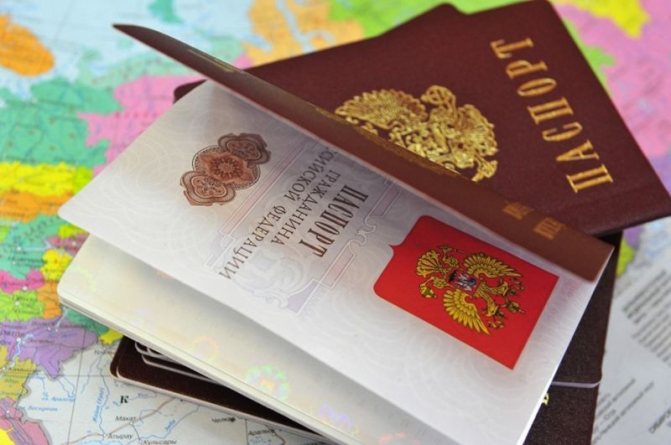
Is it possible to reverse the cancellation decision?
If you are sure that you were deprived of your status illegally, then you need to seek justice. Once you receive a cancellation decision, you can appeal it. An appeal is possible:
- through the senior management of the Ministry of Internal Affairs,
- or through the court.
It makes sense to try to cancel the cancellation if you are sure that your residence permit was taken away from you illegally. Actually, your main task when appealing is to prove the illegality of the actions of government officials when making a decision to revoke a residence permit.
